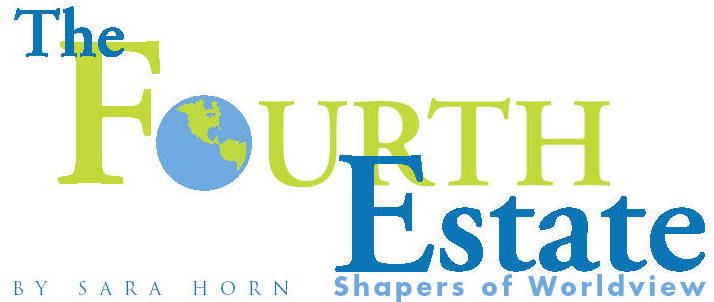

| Shaping worldview. Influencing public policy. While these
responsibilities sound like that of a politician or lobbyist, many times
it is the media that are the major players of shaping public opinion,
whether through sensationalism or hardnosed reporting. The media has often
been referred to as the “Fourth Estate,” a label coined by an Englishman
at the turn of the 20th century, implying that its power and influence on
the country was equal to that of the three existing estates – the
priesthood, aristocracy and the commons. The Fourth Estate offers a check
and balance of sorts to the powers-that-be but the media today has
increasingly undergone scrutiny and accusations of hidden agendas, biased
reporting and liberal viewpoints. It’s certainly not a profession for a
Christian or anyone with a faith in God. Or is it?
Mallard acknowledges, however, that even in the secular media, a worldview does come out. “There’s more of a blurred line of pure journalism and editorializing than ever before,” says Mallard, pointing out that a reporter’s worldview can easily be seen in follow-up questions that they give to someone they are interviewing.
“When media personalities like Tom Brokaw interview people of faith, I can tell by the follow-up questions that they don’t share the same faith – on the other hand, I’ve seen other reporters who I’ve realized are believers simply because of what they’ve said in their questions and commentary,” explains Mallard. David Aikman, a former correspondent for Time and chairman of a global fellowship of Christians in journalism, spoke recently at a conference at the National Press Club in Washington, D.C. on the challenges of good journalism. “There is a function in journalism with good moral dynamics to it,” says Aikman. “True journalists want to know the truth, and the truth is more important than the side you support.” “If you go into secular journalism, whether print or broadcast, you’re still practicing Christian principles because you’re involved in a search for truth,” says Steve Beverly, assistant professor of communication arts and a former news director for more than 20 years at several television news stations. Beverly uses an article in one of his classes that illustrates the apostle Paul as the first journalist, because of the way he told stories. “He presented it in a journalistic fashion, letters to Phillipi, letters to the Corinthians and there’s a common thread there of seeking the truth,” explains Beverly. “If you can understand and grasp that concept, then you understand that as a journalist, you’re upholding one of the most precious biblical principles that there is by merely aspiring to get into this field.” Mallard admits that students who are going into the field are facing some tough challenges, but that they’re prepared when they leave Union. “There’s a tension there for Christian students who go into the secular media,” says Mallard. “We want them to be out there, but they have to be ready for the challenge.” Beverly agrees. “There are choices that graduates will be confronted with and those values that have hopefully been instilled in them while they’re here will be what they turn to for overcoming those challenges,” says Beverly. “The Christian attempts to live a life that can be an example for shaping someone else’s. If you go into the media, the practice of reporting is designed to serve and help shape public opinion. If you practice the golden rule within the realm of what you do professionally, you're going to serve the same purpose and you have a lot of opportunity to reach a lot more people.” “Christians need to get into journalism,” says Aikman. “They can change the environment just by being themselves.” “It starts with you,” adds Mallard. “Integrity of who you are, your personal relationship with Jesus, and surrounding yourself with Christians to help you grow spiritually. No matter how strong your voice, how public your venue, if you don’t have integrity of character, no one will listen and eventually you’ll be found out. “Not everyone is called to crusade the Christian culture in public, but we are called to be faithful in the small things – in what I say and what I do,” says Mallard. “How I act and how I represent the truth is a way to shape the world for Christ.” |